This story arises out of a couple of events that happened in my life this week. It reflects how important is our attitude to our lives. Are we thankful for all the good things that have come down from heaven or are we constantly grasping for more and complaining about how little we have? As we have learned in our study of the Hebrew roots of our faith, the Jewish attitude is to give thanks to God in everything, to bless God for every good thing in life, to acknowledge that all good things come from God, whether through natural processes or miraculous processes. The birth of a child and the earning of daily bread are just as mighty miracles as the parting of the Red Sea (see the quote from Heschel at the end of this email).
So that has become more and more the way we think and the way we are. The process long precedes our acquaintance with Heschel or our ability to put it in words, but there it is. Anyway, the other day I was driving to the office and a cat bounded across the road in front of me. It wasn't much more than a kitten, and it seemed to be jumping for joy. It seemed to take an extra-high leap not caused by anything other than an essential joy of being and an ability to leap. This kitten put a smile on my face, and I blessed God for this marvelous creature He had made. Then a few seconds later, the thought came into my head, "That was a black cat! Some people would have considered that bad luck and immediately begun cursing the day they were born. Such a difference an attitude came make."
It reminded me of the military people we met overseas. We spent 20 years of a 25-year Navy career living overseas (or at least outside the U.S.—the two years in Canada weren't exactly over any sea). We heard of people (and even met a few) who never left the comfortable confines of the base or ship. Whether in Spain or Japan or Italy or Canada, there were those who minimized their contact with the local culture, food, language, and sights. We, on the other hand, took every opportunity to become acquainted with all of those, and everything else we could soak in about those countries and their peoples. Particularly in Japan, we were able to meet many wonderful people and participate in their lives. We sang in a Japanese choir, joined a Gourmet Club, taught English, shared our lives in our home and in the homes of our Japanese friends. Those who chose to stay on base would constantly complain about life outside the U.S. and would say, "there's nothing to do here; we hate the food; we hate the people; we don't speak the language." Yet, we never had enough time to do all the things that presented themselves to us outside our doors. Attitude. Thankfulness or ingratitude.
The most graphic example happened this morning on the way to Sunday School. Hannah and I were driving across town (Kathy had been called in to work unexpectedly at 3:30 in the morning). Out of the blue, Hannah says to me,"Dad, I wish everyone in the world could be as fortunate as we are." I was almost moved to tears. Here was Hannah, who was born with a rare syndrome affecting her appetite and emotional control. Because of the syndrome she will never be able to have children, which she loves more than anything in the world except perhaps dogs and horses. She will never drive, likely never marry. She will never be truly independent (she lives outside our home but in a host home with another family, who take care of her). Throw in a mild case of bi-polar disorder, and Hannah has enough problems to give her a hundred excuses to complain, but rather she says, "Dad, I wish everyone in the world could be as fortunate as we are."
Hannah often says to us that she is thankful that God put her in our family, that she has the best parents in the world. Last night Kathy asked her whether others might think their parents are the best in the world, too. Could they have the best parents in the world, too. Hannah matter of factly answered that they could--the best parents for them. We call people like Hannah "special." Some may think this a euphemism, but it is not. She is special, and we are so thankful that God put her in our family. We have learned so much from her.
Last night we made it up to the Longmont Symphony. We try to go at least once a season, and always take Hannah, because she loves it so much. My former professor of Music Appreciation plays viola and we always like to say hi to her. Last night was a lovely combination of French Impressionists, Debussy and Ravel: Prelude to the Afternoon of a Faun and three Nocturnes by Debussy and a Piano Concerto and Bolero by Ravel. What a marvelous gift music is. What infinite variety and undescribable pleasure comes from the ability to manipulate sound waves in such a diverse but pleasing manner.
Well, that about does it for this short vignette into our lives in Denver.
Love to all and Shalom
I will close with a quote that I believe applies: "Wonder or radical amazement is the chief characteristic of the religious man's attitude toward history and nature. One attitude is alien to his spirit: taking things for granted, regarding events as a natural course of things. To find an approximate cause of a phenomenon is no answer to his ultimate wonder. He knows that there are laws that regulate the course of natural processes; he is aware of the regularity and pattern of things. However, such knowledge fails to mitigate his sense of perpetual surprise at the fact that there are facts at all. Looking at the world he would say,"This is the Lord's doing; it is marvelous in our eyes" (Psalms 118:23). —Abraham Joshua Heschel, God in Search of Man, A Philosophy of Judaism. NewYork: Farrar, Straus and Girous, 1955.


































No comments:
Post a Comment